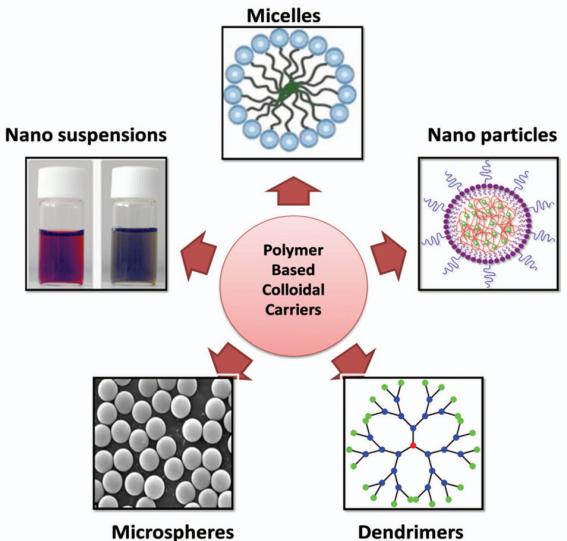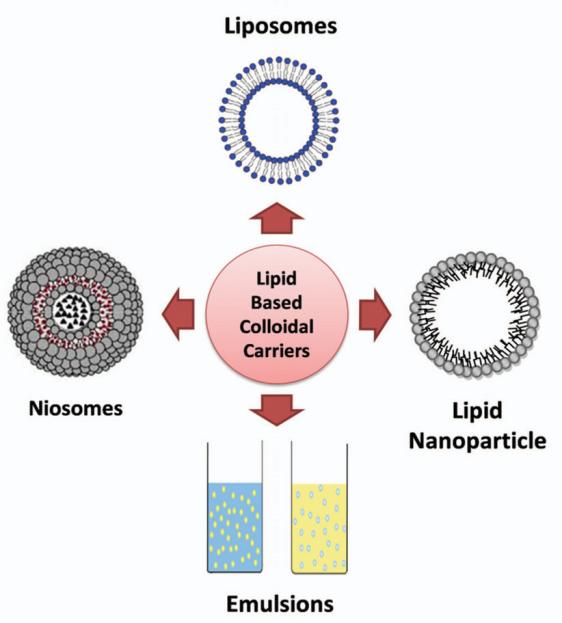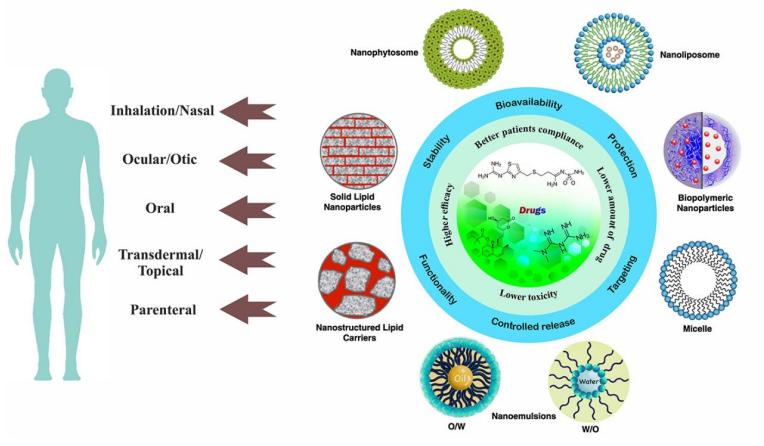Colloidal Drug Delivery System for Nanoformulations
Inquiry
Colloidal drug delivery system employs nanoparticles as vehicles to encapsulate drugs within nanocarriers or adsorb them onto their surfaces. This system integrates specific ligands, antibodies, and targeting molecules to bind to particular receptors on cell surfaces, facilitating precise and safe targeted therapy. CD Formulation specializes in providing development services for colloidal drug delivery systems tailored to nanoformulations. We utilize our advanced and innovative nanotechnology platforms to create solutions that address the diverse requirements of our customers, focusing on the design and engineering of the delivery systems themselves.
Advantages of Colloidal Drug Delivery Systems
Colloidal drug delivery systems utilize colloidal drug carriers, including nanoparticles, micelles, liposomes, emulsions, and dendrimers, to facilitate the transportation of drugs. These carriers demonstrate effective penetration of the blood-brain barrier via diverse transcellular pathways, such as endocytosis and transcytosis. They exhibit notable pharmacokinetic properties and distribution patterns in various brain disorders, including brain tumors.
- Prevents drugs from chemical, physical or biological degradation
- Targeted and controlled release of bioactive drug ingredients at specific locations
- Extends shelf life
- Improves drug bioavailability and solubility
Colloidal Carriers for Nanoformulations
Colloidal carriers can be categorized into two main types based on their primary formulation ingredients: polymer-based colloidal carriers and lipid-based colloidal carriers. Within the category of polymeric novel carriers, subtypes include particle carriers, self-assembled carriers, and capsule carriers. Lipid carriers, on the other hand, can be further classified into particle carriers, vesicle carriers, and emulsion carriers.
Polymer-based Colloidal Carriers
Colloidal carriers formulated with biocompatible and biodegradable polymers ensure targeted and controlled drug delivery. Polymeric carriers have properties such as biodegradability, biocompatibility, and easy functionalization and surface modification of the polymer.
 Fig.1 Polymer-based colloidal carriers to enhance drug delivery system. (Minakshi Prasad, et al. 2017)
Fig.1 Polymer-based colloidal carriers to enhance drug delivery system. (Minakshi Prasad, et al. 2017)
Nanoparticles: Nanoparticles are colloidal drug carriers with diameters ranging from 10 to 1000 nm.
Nanosuspensions: The less soluble drug is suspended in an aqueous stabilizer to form a nanosuspension.
Dendrimers: Dendrimers are three-dimensional micellar nanoplatforms that have a well-defined, branched, symmetrical structure and peripheral functional groups. They have a tree-like structure with a size of 20 nm. Dendrimers facilitate dual drug delivery, controlled release, enhanced solubility and easy incorporation of targeting ligands.
Micelles: Micelles are self-assembled submicroscopic aggregates of surfactants that form liquid colloids with diameters of 20-80 nm.
Lipid-based Colloidal Carriers
Lipid-based colloidal carriers are composed of physiological lipids. These carriers are well tolerated, biodegradable, generally non-toxic, and have unique properties that make them well-suited for use in drug delivery systems. Lipid-based colloidal carriers mainly include liposomes.
 Fig.2 Lipid-based colloidal carriers for higher stability and drug loading capacity. (Minakshi Prasad, et al. 2017)
Fig.2 Lipid-based colloidal carriers for higher stability and drug loading capacity. (Minakshi Prasad, et al. 2017)
Liposomes: Liposomes are extensively used for colloidal drug delivery. These formulations hinder the rapid clearance of drugs by modulating the charge, size, and surface hydration of the API.
Niosomes: Niosomes have advantages in stability, low toxicity and biocompatibility due to the presence of surfactants.
Lipid Nanoparticles: Lipid nanoparticles are colloidal structures composed of a dispersed lipid phase and an emulsifier serving as a stabilizer.
Emulsion-based Systems: Emulsions are multiphase systems composed of oil and water phases. Microemulsions are transparent, thermodynamically stable systems consisting of oil, water, surfactants and co-surfactants that can dissolve water-soluble and oil-soluble compounds.
Types of Colloidal Drug Delivery Systems
We have researched four types of colloidal drug delivery systems such as emulsions drug delivery systems, vesicular drug delivery systems, particulate drug delivery systems and micelle drug delivery systems.
Emulsion Drug Delivery Systems
We have developed emulsion drug delivery systems including multiple emulsions, microemulsions and submicron emulsion systems using oil, water, surfactants and co-surfactants.
Versicular Drug Delivery Systems
Our team has researched vesicular drug delivery systems such as liposomes and ethosomes for many years and has developed lipid drug delivery systems such as liposomes, ethosomes, liposomes, pharmacosomes, plant liposomes and transfersomes.
Particulate Drug Delivery Systems
Based on our nanoparticle technology platform, we have developed multiple particulate drug delivery systems such as solid lipid nanoparticles (SLN), solid lipid microparticles (SLM), nanostructured lipid carriers (NLC), dendrimers, nanocrystals, polymer nanoparticles, and gold nanoparticles.
Micelle Drug Delivery Systems
With the support of our mature polymeric micelle platform and advanced micelle technology platform, we have developed micellar drug delivery systems including polymeric micelles, reverse micelles and mixed micelles.
 Fig.3 Four types of colloidal drug delivery systems. (Sukhbir Singh, et al. 2021)
Fig.3 Four types of colloidal drug delivery systems. (Sukhbir Singh, et al. 2021)
Highlights of Our Colloidal Drug Delivery System Development
- Depending on our advanced nanotechnology platform, we have developed four types of colloidal drug delivery systems, such as emulsions drug delivery systems, vesicular drug delivery systems, particulate drug delivery systems and micelle drug delivery systems.
- We are good at designing and customizing colloidal drug delivery systems for nanoformulation, ensuring that the quality of colloidal drug delivery systems meets customers' specific requirements.
- Our team also has accumulated a lot of experience in the preparation of colloidal carriers for nanoformulation including polymer-based colloidal carriers and lipid-based colloidal carriers.
Custom Colloidal Nanoformulation Development Services
We have conducted in-depth research on colloidal nanoformulation development. With our advanced colloidal drug delivery system, we provide customized formulation development services for nanoparticles, liposomes, nanoemulsions and polymeric micelles. Our technical team has conducted in-depth research on colloidal carriers and colloidal drug delivery systems and can develop colloidal nanoformulations for different purposes, such as nanoparticles, liposomes, nanoemulsions, polymer micelles, etc., to help the clinical transformation and commercial application of different nanoformulations.
Nanoparticle Development for Nanomedicine
Utilizing our advanced nanoparticle technology platform, we can tailor nanoparticles to meet individual customer needs. Our offerings include solid lipid nanoparticles, lipid nanoparticles, albumin nanoparticles, and polymeric nanoparticles.
Liposome Development for Nanomedicine
With our mature liposome nanotechnology platform, we can customize liposomes to suit various customer requirements. Our in-depth research on liposome characteristics, preparation methods, and applications enables us to offer high-quality personalized solutions.
Nanoemulsion Development for Nanomedicine
Leveraging our nanoemulsion technology platform, we can swiftly tailor nanoemulsions to meet the unique needs of our customers. By deeply understanding and exploring the distinctive properties, preparation techniques, and applications of nanoemulsions, we offer professional customization solutions.
Polymeric Micelle Development for Nanomedicine
Supported by our polymeric micelle technology and colloidal drug delivery system, we can rapidly meet customers' specific needs by customizing polymeric micelles. By understanding the unique properties, preparation methods, and applications of these micelles, we offer professional customization solutions.
Published Data
Technology: Colloidal plant-based targeted drug delivery systems
Journal: Advances in Colloid and Interface Science
IF: 15.6
Published: 2022
Results:
The authors outline the general characteristics and requirements of colloidal drug delivery systems and discuss the opportunities and challenges of using plant-derived ingredients (such as plant proteins, polysaccharides, lipids, and phospholipids) to manufacture colloidal particles for drug delivery applications. Finally, the authors review the potential clinical applications of plant-based colloidal drug delivery systems. These colloidal delivery systems can encapsulate, protect, and release drugs, vitamins, and nutraceuticals, thereby improving their bioavailability and efficacy. Colloidal drug delivery systems have been shown to achieve controlled or targeted delivery of drugs through various routes of administration, including oral, nasal, dermal, and inhalation. The pharmacokinetic and pharmacodynamic characteristics of drugs can be modulated by varying the composition, size, and structure of drug formulations created using plant-based colloidal delivery systems.
 Fig.4 Colloidal plant-based targeted drug delivery systems. (Keyhan Mohammadi, et al. 2022)
Fig.4 Colloidal plant-based targeted drug delivery systems. (Keyhan Mohammadi, et al. 2022)
With the in-depth study of nanotechnology, the research and clinical application of colloidal drug delivery systems has attracted more and more attention. CD Formulation has long been committed to the exploration and research of colloidal drug delivery systems, helping many researchers and pharmaceutical companies develop related products and clinical transformation. If you have any questions about colloidal drug delivery systems, please contact us.
References
- Minakshi Prasad, Koushlesh Ranjan, Basanti Brar, et al. Virus-Host Interactions: New Insights and Advances in Drug Development Against Viral Pathogens. Current Drug Metabolism. 2017,18,942-970.
- Sukhbir Singh, Neelam Sharma, Tapan Behl, et al. Promising Strategies of Colloidal Drug Delivery-Based Approaches in Psoriasis Management. Pharmaceutics. 2021, 13, 1978.
- Keyhan Mohammadi, Mahmood Alizadeh Sani, Maryam Azizi-Lalabadi, et al. Recent progress in the application of plant-based colloidal drug delivery systems in the pharmaceutical sciences. Advances in Colloid and Interface Science. 2022,307:102734.
How It Works
STEP 2
We'll email you to provide your quote and confirm order details if applicable.
STEP 3
Execute the project with real-time communication, and deliver the final report promptly.
Related Services


 Fig.1 Polymer-based colloidal carriers to enhance drug delivery system. (Minakshi Prasad, et al. 2017)
Fig.1 Polymer-based colloidal carriers to enhance drug delivery system. (Minakshi Prasad, et al. 2017) Fig.2 Lipid-based colloidal carriers for higher stability and drug loading capacity. (Minakshi Prasad, et al. 2017)
Fig.2 Lipid-based colloidal carriers for higher stability and drug loading capacity. (Minakshi Prasad, et al. 2017) Fig.3 Four types of colloidal drug delivery systems. (Sukhbir Singh, et al. 2021)
Fig.3 Four types of colloidal drug delivery systems. (Sukhbir Singh, et al. 2021) Fig.4 Colloidal plant-based targeted drug delivery systems. (Keyhan Mohammadi, et al. 2022)
Fig.4 Colloidal plant-based targeted drug delivery systems. (Keyhan Mohammadi, et al. 2022)
